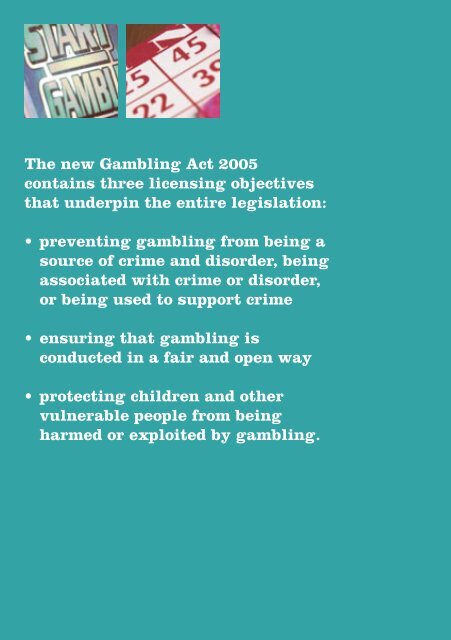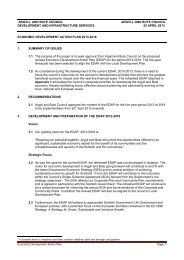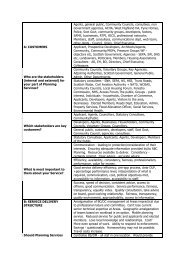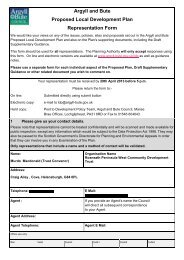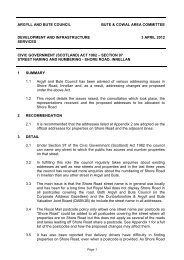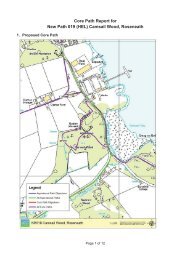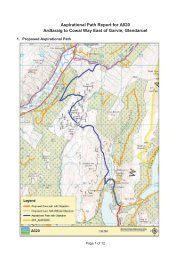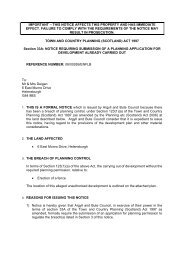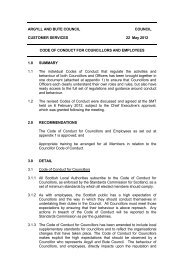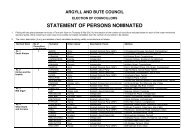New Gambling Act 2005 - Objectives - Argyll and Bute Council
New Gambling Act 2005 - Objectives - Argyll and Bute Council
New Gambling Act 2005 - Objectives - Argyll and Bute Council
Create successful ePaper yourself
Turn your PDF publications into a flip-book with our unique Google optimized e-Paper software.
More informationFurther details can be found in the <strong>Gambling</strong>Commission’s Guidance to Licensing Authorities<strong>and</strong> the DCMS’ <strong>Gambling</strong> <strong>Act</strong> <strong>2005</strong> – TransitionalArrangements <strong>and</strong> <strong>Gambling</strong> <strong>Act</strong> <strong>2005</strong> – TrainingMaterials for Licensing Authorities.Department for Culture Media <strong>and</strong> Sportwww.culture.gov.uk<strong>Gambling</strong> Commissionwww.gamblingcommission.gov.ukLocal Authorities Coordinatorsof Regulatory Serviceswww.lacors.gov.ukInstitute of Licencingwww.instituteoflicensing.org2-4 Cockspur Streetlondon SW1Y 5DHwww.culture.gov.ukOur aim is to improve the quality of life for all throughcultural <strong>and</strong> sporting activities, support the pursuit ofexcellence, <strong>and</strong> champion the tourism, creative <strong>and</strong>leisure industries.
<strong>New</strong> <strong>Gambling</strong> <strong>Act</strong> Explained<strong>Council</strong>lorsKEEPING GAMBLING CRIME FREE, FAIR AND OPEN, PROTECTING CHILDREN AND VULNERABLE ADULTSimprovingthe qualityof life for all
This leaflet has been prepared by theDepartment for Culture, Media <strong>and</strong>Sport’s (DCMS) <strong>Gambling</strong> Division tohelp Local Authority <strong>Council</strong>lors to betterunderst<strong>and</strong> their new role under the<strong>Gambling</strong> <strong>Act</strong> <strong>2005</strong>.BackgroundThe new <strong>Gambling</strong> <strong>Act</strong> <strong>2005</strong> comes intoforce on 1 September 2007. It has createda unified regulator for gambling in GreatBritain called the <strong>Gambling</strong> Commission,as well as establishing a new licensingregime for commercial gambling. The<strong>Gambling</strong> Commission will regulatecommercial gambling in Great Britain,except the National Lottery <strong>and</strong> SpreadBetting, <strong>and</strong> will issue operating <strong>and</strong>personal licences.The <strong>Gambling</strong> <strong>Act</strong> <strong>2005</strong> transfers allresponsibility for licensing gamblingpremises from Licensing Justices toLicensing Authorities (the Local Authorityin Engl<strong>and</strong> <strong>and</strong> Wales). LicensingAuthorities will also be responsible fora number of different permits, as well astemporary <strong>and</strong> occasional use notices. InScotl<strong>and</strong>, local authority licensing boardswill be the licensing authorities responsiblefor gambling functions under the <strong>Act</strong>.Local Authorities <strong>and</strong> the new <strong>Act</strong>Local Authorities acting as LicencingAuthorities will now issue premiseslicences for the following activities:• bingo• betting• adult gaming centres• Family Entertainment Centres• casinos• sporting tracks, including horse racing<strong>and</strong> dog tracks.They will issue permits for:• gaming machines in alcohol licensedpremises, such as pubs• gaming machines for members clubs• other gaming activities inmembers’ clubs• category D machines * in unlicensedFamily Entertainment Centres• prize gaming.* Category D machines are those that can be used by children<strong>and</strong> have the lowest level of stakes <strong>and</strong> prizesThey will also register <strong>and</strong> issue:• small society lotteries• occasional <strong>and</strong> temporary use notices• provisional statements.
<strong>Council</strong>lors <strong>and</strong> the new <strong>Act</strong>For premises licence applications <strong>and</strong>reviews, <strong>Council</strong>lors will sit on licensingcommittees as they do for the Licensing<strong>Act</strong> 2003. For permits other arrangementsmay apply, depending upon delegations.In Scotl<strong>and</strong>, the relevant procedures ofthe licensing boards will apply.Unlike the Licensing <strong>Act</strong> 2003, <strong>Council</strong>lorsmay make representations without beingasked by a resident specifically to do so,although they will have to bear in mindwider issues of bias, prejudice <strong>and</strong> personalinterests. Representations may only bemade in relation to premises licences,not permits.The new <strong>Gambling</strong> <strong>Act</strong> requires that allLocal Authorities prepare, consult <strong>and</strong>publish a Statement of <strong>Gambling</strong> Policy,which sets out the principles of how it willcarry out this licensing work over the nextthree years. These will be open to publicconsultation <strong>and</strong> must be approved by thefull council before final publication.Applications – Premises LicencesLicensing Authorities will acceptapplications under the new <strong>Act</strong> from30 April 2007. All operators must applyfor new permissions under the new <strong>Act</strong>if they wish to operate after 1 September2007. This also applies to all operatorswanting to continue an existing businessor start a new operation.A Licensing Authority should aim topermit the use of premises for gamblingif it believes that the application is:• in accordance with any relevantGuidance or Codes of Practice issuedby the <strong>Gambling</strong> Commission• reasonably consistent with the licensingobjective• in accordance with the Authority’sStatement of <strong>Gambling</strong> Policy.Processing Applications –Premises LicencesWhen an application for a premiseslicence is being made, representationsfrom external parties may be made aboutthe application. The Licensing Authoritywill consider all relevant representations,as well as other factors, before makinga final decision.Only representations made by aResponsible Authority or Interested Partywill be considered <strong>and</strong> they must berelevant. The definitions of these twocategories differ from those included inthe Licensing <strong>Act</strong> 2003.
A Responsible Authority must be notifiedby the applicant when an applicationfor a premises licence is being made.A Responsible Authority is a public bodywhich can make a representation inrelation to the application, as well asto an existing licence.They are:• a Licensing Authority in Engl<strong>and</strong> <strong>and</strong>Wales in whose area the premises iswholly or partly situated• a Local Authority (in Scotl<strong>and</strong>)• the <strong>Gambling</strong> Commission• a Police Authority• a Fire <strong>and</strong> Rescue Authority• a Planning Authority• a Environmental Health Authority(or equivalent)• the body designated by the localauthority as competent to adviseabout the protection of children fromharm (Social Services etc)• the HM Revenue <strong>and</strong> Customs• Navigation Authorities (EnvironmentAgency, British Waterways Board,Maritime <strong>and</strong> Coastguard Agency) <strong>and</strong>the Secretary of State (for vessels only).An Interested Party is a person who:• lives sufficiently close to the premises tobe affected by the authorised activities• has business interests that might beaffected by the authorised activities• represents people in either of the abovegroups (eg lawyer, accountant, councillor,community association, chamber ofcommerce etc).Representations that are relevant arethose issues which relate to the gamblingCommission’s Guidance or Codes ofPractice; issues related to the <strong>Gambling</strong><strong>Act</strong> <strong>2005</strong>’s three licensing objectives(as listed above); or issues related to theAuthority’s Statement of <strong>Gambling</strong> Policy.Where Responsible Authorities makerepresentations that are not relevantunder the new <strong>Act</strong>, they may take actionunder their own legislation <strong>and</strong>enforcement powers.A premises licence, once issued, will be setfor an unlimited duration but the LicensingAuthority does have the power to review<strong>and</strong> revoke it any time, <strong>and</strong> it may besurrendered or lapsed due to death orbankruptcy of the holder.
The Licensing Authority may grantpremises licences to pleasure boats <strong>and</strong>floating restaurants, but a vessel goinginto international waters (eg a crosschannelferry) does not need a licence.Trains <strong>and</strong> cars are not entitled to holda premises licence.Licence Conditions – Premises LicencesThere are a number of conditions attachedto premises licences under the new <strong>Act</strong>,<strong>and</strong> additional conditions may also beattached by both the Secretary of State<strong>and</strong> the Licensing Authority.M<strong>and</strong>atory conditions are set by theSecretary of State or Scottish Ministers.A Licensing Authority has no powerto remove or vary these m<strong>and</strong>atoryconditions.Default conditions are attached in thesame way as m<strong>and</strong>atory conditions,however, the Licensing Authority mayremove or replace them. The <strong>Gambling</strong>Commission’s Guidance suggests thatthese default conditions are expected tobe the industry norm. Whilst LicensingAuthorities may remove default conditionsif they think this is appropriate, they mustconsider carefully before imposing aregime that is stricter than the one thatis expected to be the industry norm.The Licensing Authority may also attachindividual conditions to a licence, forexample, door supervision.Unlike the Licensing <strong>Act</strong>, officers maymake recommendations to add conditionsto premises licences without the need tomake formal recommendations.HearingsThe Licensing Committee must consideran application at a hearing if relevantrepresentations are made <strong>and</strong> notwithdrawn, or if the licensing officerproposes that individual conditions shouldbe attached to the licence (either newconditions or the removal/variation ofdefault conditions). Regulations regardinghearings will be published.The Licensing Committee will usuallydelegate to a licensing officer to grantor reject an application where norepresentations are made, unlessconditions are to be attached.
AppealsAppeals against decisions made byLicensing Authorities in Engl<strong>and</strong> <strong>and</strong>Wales are made to the Magistrates’Court in Engl<strong>and</strong> <strong>and</strong> to the Sheriff’scourt in Scotl<strong>and</strong>.FeesThe Secretary of State will set fee maximafor premises licenses. Licensing Authoritieswill then set precise fees, limited to costrecovery. This will allow Authoritiesflexibility <strong>and</strong> the industry a degreeof certainty.In addition, excellent performingAuthorities (those with top CPA ratings)will be able to set premises licence feesabove the maxima, but again limited tocost recovery.CasinosLocal Authorities have new powers to:• issue premises licenses for casinos• resolve not to issue any further casinopremises licenses in their area.In Scotl<strong>and</strong>, licensing boards will performthese functions.The <strong>Act</strong> creates three new casinocategories <strong>and</strong> initially allows for 17new premises licences to be issuedacross Britain: 1 regional, 8 large <strong>and</strong>8 small casinos.An independent panel will advise theGovernment where these new casinosshould be located, once an assessmentof their social impact <strong>and</strong> the likelyregeneration benefits has been made.



